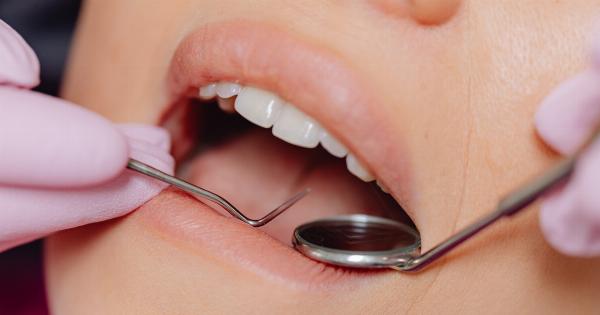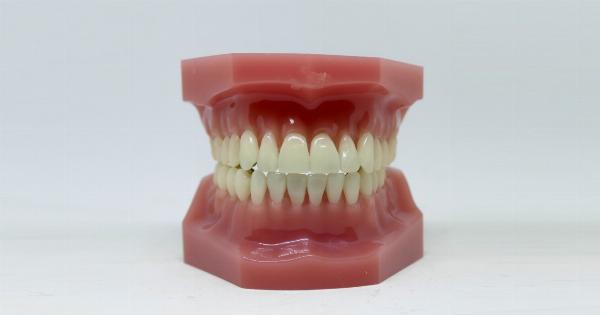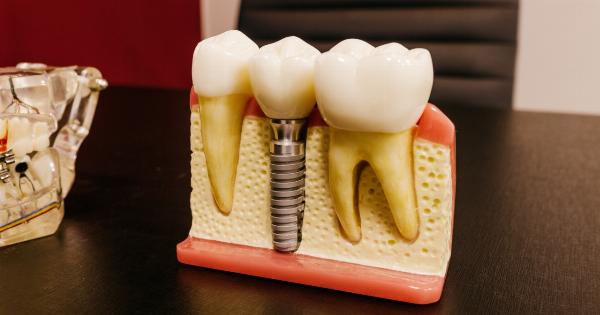Tooth sensitivity, also known as dentin hypersensitivity, is a common dental problem that affects millions of people worldwide.
It is characterized by a sharp and transient pain in response to certain stimuli, such as hot or cold foods, sweet or acidic substances, or even brushing and flossing. This discomfort can range from mild to severe, and it can significantly impact a person’s quality of life.
There are several factors that can contribute to tooth sensitivity. By understanding these causes, individuals can take appropriate steps to manage and prevent this troublesome issue. Let’s explore the guilty factors behind tooth sensitivity.
Poor Oral Hygiene
One of the leading causes of tooth sensitivity is poor oral hygiene. Inadequate brushing and flossing can lead to a buildup of plaque and tartar on the teeth. Over time, this can erode the tooth enamel and expose the sensitive dentin underneath.
Regular brushing and flossing, along with routine dental cleanings, can help prevent tooth sensitivity caused by poor oral hygiene.
Gum Recession
Gum recession is another common factor contributing to tooth sensitivity. When gums recede, the roots of the teeth become exposed.
Unlike the protective enamel covering the crowns of the teeth, the root surfaces are covered by cementum, which is much softer and more easily eroded. This exposes the dentin, leading to sensitivity. Good oral hygiene practices and gentle brushing techniques can help prevent gum recession.
Dental Cavities
Untreated dental cavities can also be to blame for tooth sensitivity. When a cavity forms, it creates a pathway for bacteria to reach the inner layers of the tooth, including the dentin. This can cause inflammation and irritation, leading to sensitivity.
Regular dental check-ups and prompt treatment of any cavities can help prevent tooth sensitivity caused by decay.
Enamel Erosion
Enamel erosion can result from various factors such as excessive consumption of acidic foods and drinks, acid reflux, and aggressive tooth brushing.
Acidic substances can soften and wear away the protective enamel, exposing the underlying dentin and making the teeth more sensitive. It is advisable to limit the intake of acidic foods and drinks and use a soft-bristled toothbrush to minimize enamel erosion.
Teeth Grinding
Bruxism, or teeth grinding, is a habit that can have detrimental effects on the teeth and lead to sensitivity. The excessive force exerted during grinding can wear down the tooth enamel, exposing the sensitive dentin.
Using a mouthguard at night and managing stress can help alleviate the symptoms of bruxism and reduce tooth sensitivity.
Cracked Teeth
Cracked or fractured teeth can cause tooth sensitivity, especially when the crack extends into the dentin. The crack may be visible or invisible, making it challenging to diagnose without the help of a dental professional.
Dental treatment such as bonding, crowns, or root canal therapy may be necessary to alleviate sensitivity caused by cracked teeth.
Improper Dental Procedures
Occasionally, dental procedures themselves can lead to tooth sensitivity. This can occur when a dentist performs a procedure that irritates the tooth pulp or when an excessive amount of dental material is removed.
The sensitivity is usually temporary and will resolve on its own. However, if the sensitivity persists, it is crucial to consult the dentist to determine if any further treatment is needed.
Aggressive Whitening
Teeth whitening, when done improperly or excessively, can cause tooth sensitivity. The bleaching agents used in whitening treatments can irritate the tooth nerves and lead to sensitivity.
It is recommended to follow the instructions provided by dental professionals and to use whitening products in moderation to avoid excessive tooth sensitivity.
Aging
As we age, our teeth naturally become more sensitive. The protective enamel tends to thin out over time, exposing the underlying dentin. Additionally, receding gums are more prevalent in older individuals, further contributing to sensitivity.
Good oral hygiene practices and regular dental visits are essential for maintaining oral health as we age.
Dietary Factors
Certain dietary factors can also contribute to tooth sensitivity. Consuming excessive amounts of sugary or acidic foods and drinks can erode the enamel and lead to sensitivity.
Additionally, a diet lacking in essential nutrients can weaken the teeth, making them more susceptible to sensitivity. A balanced diet that includes calcium-rich foods, fruits, vegetables, and plenty of water can promote healthy teeth and reduce sensitivity.
Conclusion
Tooth sensitivity can be a bothersome condition, but by recognizing and addressing its guilty factors, individuals can take proactive steps to manage and prevent it.
Good oral hygiene practices, regular dental check-ups, a balanced diet, and avoiding habits such as teeth grinding or aggressive whitening can go a long way in reducing tooth sensitivity and promoting oral health.






























